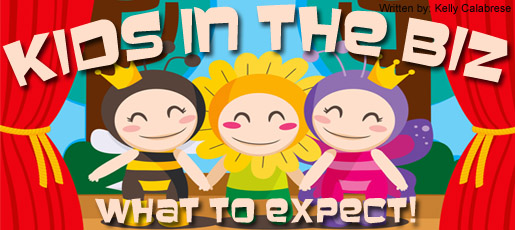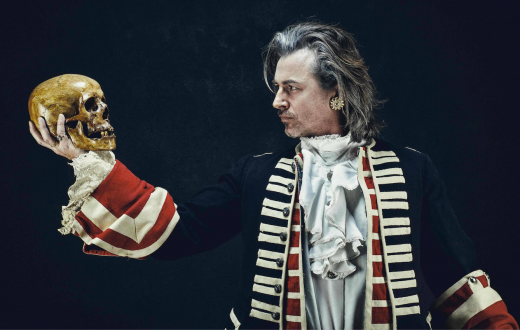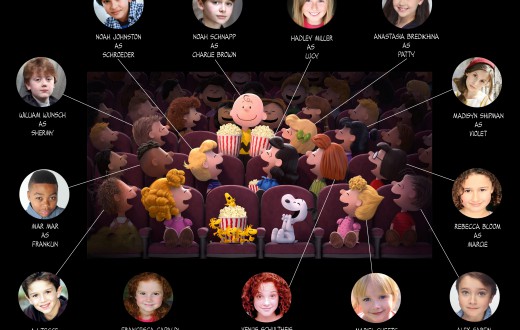For young actors, Hollywood can seem downright enchanting! But is it really all red carpets, skipping school, and movie magic?
To get the real scoop on what it’s like to be a kid in the biz, NYCastings spoke with actors and directors about their current experiences and career flashbacks…
Alex Ferris – 15 years old
 Alex Ferris began his acting career with a film that premiered in 2004, The Five People You Meet in Heaven with John Voigt. Since then he appeared in a ton of film and TV including X-Men: The Last Stand, The L Word, Harper’s Island, Diary of a Wimpy Kid and Martha Speaks. Alex just appeared in Replicas at The Tribeca Film Festival.
Alex Ferris began his acting career with a film that premiered in 2004, The Five People You Meet in Heaven with John Voigt. Since then he appeared in a ton of film and TV including X-Men: The Last Stand, The L Word, Harper’s Island, Diary of a Wimpy Kid and Martha Speaks. Alex just appeared in Replicas at The Tribeca Film Festival.
Q: When you first started out, what did you expect a TV / Film set to be like?
I can’t remember exactly what I thought a film set would be like as my first acting job was when I had just turned seven. I can remember expecting to see excitement, big time Hollywood and huge trailers. I thought I was creating for myself an extremely glamorous part-time hobby. I was really too young to understand that I wouldn’t be starring in blockbuster films all the time. I also remember thinking how fun it was to have a hobby that allowed you to miss school. Because I am one of three children and my family is busy, I really had to beg my parents to let me act. I think that this made me want it even more.
 Q: What was the TV/Film set actually like?
Q: What was the TV/Film set actually like?
The first project I ever worked on was a TV movie with John Voigt and Jeff Daniels called theThe Five People You Meet in Heaven. The film shot in an amusement park which was very magical. We had great weather and delicious catering. I remember how cool it was that I got to sit in the director’s chair. When the shoot was over the props people sent me home with a gigantic bunch of balloons that they were finished with. The crew and cast, especially John Voigt, couldn’t have been nicer. I was lucky to start my career off with such a nice experience because not all movie sets are quite so enjoyable.
Q: What surprised you the most about the business?
From the perspective of an outsider, the movie industry looks infinitely more glamorous than it is. Most actors never see a red carpet or attend a premiere. I was certainly taken aback by just how difficult it is to succeed in the industry. While you do get to miss your own school while you are working, you actually have to do more school work while you are on set. Each work day you are expected to do a minimum of three hours school work with a tutor in a trailer turned classroom. My teachers make sure that I make up everything I miss. Cramming a full day of school into three hours while putting in a full day on set requires a lot of focus. Many child actors are homeschooled, but a bargain that I struck with my parents is that I stay in a traditional school and maintain great grades or no acting!
Q: What did you learn on the set of Replicas?
Replicas was my first movie shoot as a teenager. Now that I am older, I am able to grasp a much better understanding of what is going on around me, and all the skill sets that the crew brings to the film, and all the talented people that it takes to make a movie. Working on Replicas was an amazing experience because the director Jeremy Regimbal and the screenwriter (and star) Josh Close are very young and extremely creative. Not only are they making movies but they founded and produce a really cool magazine called The Lab. I found their talent and dedication truly motivating to me as an actor.
Q: Any other advice for young actors?
You really have to love acting and the whole movie industry to be able to take all the criticism and rejection that each actor will inevitably face. You have to enjoy the audition process which involves hours of preparation for each audition with very little notice. You have to have a parent willing to drive you all over town on a day’s notice to go to an audition that will often run far behind schedule. For me I think I continue to act because I can’t imagine anything that makes me happier than nailing an audition, leaving it all on the table, and knowing that whether I get cast for the role or not I had a great time trying.
Quinn Lord – 13 years old
 Quinn Lord is on the fastrack to stardom, having already appeared in many acclaimed TV shows and films including ToddWorld (TV series), Hardy the Hippo, Supernatural, Smallville, Trick ‘r Treat, Fringe, and The Imaginarium of Doctor Parnassus. Quinn just appeared in Replicas at The Tribeca Film Festival.
Quinn Lord is on the fastrack to stardom, having already appeared in many acclaimed TV shows and films including ToddWorld (TV series), Hardy the Hippo, Supernatural, Smallville, Trick ‘r Treat, Fringe, and The Imaginarium of Doctor Parnassus. Quinn just appeared in Replicas at The Tribeca Film Festival.
Q: When you first started out, what did you expect a TV / Film set to be like?
I was 5 when I first started, my first booking was for a Hasbro Play-Doh commercial. When I was auditioning I was supposed to push a hollow head onto a small lump of Play-Doh to make it ooze out of the holes cut out in the shape that would make an afro, but it only oozed out of the eyes and the mouth, along with two small holes on the fro the first time. I was mesmerized and determined to make a full fro. Once booked I didn’t expect the set to be anything more than the audition room!
Q: What was the TV/Film set actually like?
 When I got to the shoot my eyes popped out of my head and my jaw dropped to the floor, it was a huge studio with multiple sets for different Hasbro commercials in the middle, everything was so colourful and brightly lit, I loved it! I got to play with Play-Doh and push the gooey substance through the eyes and mouth all day! I remember them filming me, and the director showing me where to sit, but I was having so much fun I forgot they were there!
When I got to the shoot my eyes popped out of my head and my jaw dropped to the floor, it was a huge studio with multiple sets for different Hasbro commercials in the middle, everything was so colourful and brightly lit, I loved it! I got to play with Play-Doh and push the gooey substance through the eyes and mouth all day! I remember them filming me, and the director showing me where to sit, but I was having so much fun I forgot they were there!
After working on commercials until I was 6, I got tired of constantly smiling and wanted to do TV and film, when I booked my first TV role and my character poked his thumb into another characters eye, I knew it was for me!
Q: What surprised you the most about the business?
When I was 5 I didn’t even think there would be traveling involved! I’ve traveled all over the place, including Cape Town South Africa! I love visiting other places /cultures and meeting TONS of nice people!
I was a little surprised the first time they said, Okay Quinn, let’s get some schooling in I was thinking, How did they find me here? Just kidding! I love the onset tutors, we have tons of fun and get a lot accomplished..
Q: What did you learn on the set of Replicas?
Well, I really want to direct someday and have written a bunch of scripts (I love writing) so I try and take everything in and get tips from other actors. I think from this cast I learned what I call a psychological simmer, by keeping the films tension going in a realistic way, I want to use it in a film I direct one day. I also learned that I can easily scare people by just standing faced into a corner of the room, like the ending of Blair Witch. Did I mention I like to have fun on set?
Q: Any other advice for young actors?
Yes, live in the moment! Feel the feelings of the character for real, remember times you felt that way and use it. Most of all HAVE FUN!
Rachel Miner
 Rachel Miner wanted to be an actress from age two. She began working with an acting coach at eight, got an agent at nine and, by ten, had not only worked for Woody Allen, but was cast as “Michelle Bauer” on Guiding Light (a part that started as recurring and evolved into a contract role lasting nearly five years (1990-1995) and earning her three Young Artist Awards and an Emmy nomination). Rachel just appeared in Replicas at The Tribeca Film Festival.
Rachel Miner wanted to be an actress from age two. She began working with an acting coach at eight, got an agent at nine and, by ten, had not only worked for Woody Allen, but was cast as “Michelle Bauer” on Guiding Light (a part that started as recurring and evolved into a contract role lasting nearly five years (1990-1995) and earning her three Young Artist Awards and an Emmy nomination). Rachel just appeared in Replicas at The Tribeca Film Festival.
Q: What was your childhood acting experience like?
I officially started acting when I was eight but was on camera for the first time as a baby and I think it is a wonderful thing for kids to be able to do, if it is what they want.
One of the things that my parents did, which was smart, is they said, “If you really want to act, you need to go to acting classes.”
It was actually through the acting classes that I got an agent. But it was something I had to work for and really want. It wasn’t just a vacation or to skip school which some kids may think. On the other hand, I feel as if I didn’t get into trouble because I was so busy working. A lot of kids get bored and act out, and I didn’t have the time to do that. It can be a wonderful thing to get to do.
Q: What was the effect on your parents / family?
 My mom had to devote a lot of her life to schlepping me around to auditions and jobs. It is a commitment by the parents.
My mom had to devote a lot of her life to schlepping me around to auditions and jobs. It is a commitment by the parents.
You see some parents try to micro manage and I think that is a big mistake. Rather than support, they almost want to say the lines for the kids. I was lucky enough to have parents who didn’t do that. I was able to make my own choices.
Q: How did the reality of acting differ from your expectations?
One of the reasons why my parents didn’t let me act at age 2 is I had gotten a callback, they put me on video, and I didn’t understand the process enough. I thought I had shot the movie. They were recording me so I kept asking, “When is my movie coming out?” My parents were so heartbroken that I kept asking, that I couldn’t understand that there wasn’t a movie coming out. They made me wait until I was old enough to really understand what I was doing.
Q: Do you have any advice for young actors?
I worked with Lloyd Bridges when I was very young and one of the things he taught me was to be aware, in the moment, and relax a bit. I remember, as a kid, everything was about trying to prepare and trying to micromanage. I took it so seriously. I really, really, really wanted to do a good job. As actors we tend to feel that way. And Lloyd said that he would help me with my acting if I would help him with his lines because I had memorized everyone else’s lines in addition to my own lines. He taught me to have a sense of humor, relax, and just pay attention to the people around me.
Jeremy Power Regimbal – Director of Replicas
Q: You directed young actors in Replicas, where there any obstacles?
 This film is a dark subject matter so we had to creatively solve things. We were all trying to protect them from seeing what they shouldn’t. At the same time, you want to make it believable. The parents are there in case they think that anything is going too far, but I felt it was my responsibility to make sure everyone felt comfortable.
This film is a dark subject matter so we had to creatively solve things. We were all trying to protect them from seeing what they shouldn’t. At the same time, you want to make it believable. The parents are there in case they think that anything is going too far, but I felt it was my responsibility to make sure everyone felt comfortable.
The actors were also only allowed to be there until a certain hour and most of the film was shot at night. So you have to creatively work around that too.
Q: Any auditioning advice for young actors?
In auditioning, it is hard at a young age to realize that you don’t have to act. To realize that acting isn’t acting. A lot of the younger actors were so theatrical. But both Alex and Quinn were so confident and comfortable. And they already have huge resumes.
It is an interesting thing to be involved. I admire kids that are into it.
Julia Dyer – Director of THE PLAYROOM
Q: You film centers around four children in their attic hideaway who make up a fantastic story, while downstairs their parents weave a drunken intrigue of their own. Where there any specific challenges working with a young cast?
 Ian Veteto was 6 when he played Sam. I had worked with kids before but never where they are working eight hours a day, over a month. That is a hard job for a young child. There is a lot of persistence and a lot of disciple to ask for a child that age. What I learned is that the parent is a huge part of that. They are working just as hard as the kid and have to make that sacrifices to be on the set, and be taking care of the child. It is a tough road for parents with kids working in the business, and for the other siblings.
Ian Veteto was 6 when he played Sam. I had worked with kids before but never where they are working eight hours a day, over a month. That is a hard job for a young child. There is a lot of persistence and a lot of disciple to ask for a child that age. What I learned is that the parent is a huge part of that. They are working just as hard as the kid and have to make that sacrifices to be on the set, and be taking care of the child. It is a tough road for parents with kids working in the business, and for the other siblings.
The parent needs to believe in the project. We had a lot of conversations about this leading up to the film. My biggest concern wasn’t that Ian couldn’t do it. He was so right for it, was mature, had self control, and was smart. I was worried that he wouldn’t be able to stick it out, and that his mom wouldn’t be able to stick it out.
I said, “There are going to be times when your child will want o go home, and be tired. It will come down to you. As a parent, you are going to have to make that choice to say to him ‘he has to stay.'”
Q: Did anything unexpected happen?
We have one scene where there is a storytelling sequence and all the kids are in a circle. They all had to be there. It is a pivotal scene. We did it on the last day and Ian was very ill. He was throwing up. The mother called me from the car and I thought she was going to cancel, which would have been devastating. We didn’t have any other days left to shoot it. And God bless her. She said, “I am going to bring him. I don’t know how this is going to work but we will do the best we can.”
They were such heroes. Ian would come in and sit as long as he could and do the most that he could until he had to go get sick and take a nap for two hours. Then, when he woke up, he would work again.
I am sure it was really painful for the parents. But they found a way to make it work.
To see a child work that hard and be that committed, that’s why I am so glad to have the film here (at Tribeca). It means that Ian can be at the premier. He can have fun and enjoy it.







